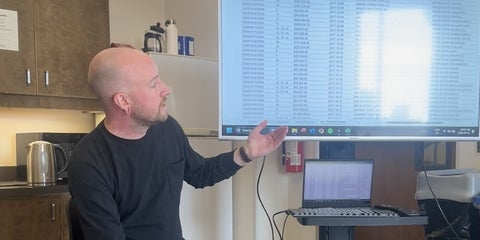
Using data to advance peace
The Kindred Credit Union Centre for Peace Advancement’s vision of advancing peace through collaboration can be described in various ways. For example, organizations affiliated with the Centre advance their work by engaging in collaborative research projects and community engagement initiatives. The use of data is one important element that lies behind these collaborative efforts.
Project Ploughshares, a founding Core Collaborator, is a peace research institute with a focus on disarmament efforts and international security. Kelsey Gallagher, Senior Researcher at Project Ploughshares, researches conventional arms control and the Canadian arms trade.
Kelsey’s most recent report, titled “Global Production of the Israeli F-35I Joint Strike Fighter,” examined data about the flow of conventional arms and technologies to participatory states of the F-35 program, one of the largest joint military production programs in history. The data compiled was collected from open, online sources in November 2024, and was used to curate an even more extensive dataset.
“Compiling this dataset was not an easy task,” said Gallagher at a recent Centre for Peace Advancement weekly coffee break. It took months of preparation, research, and editing to create and will need to be updated as additional information becomes available. The dataset includes information about the contracts that contributed to the production of F-35s, including individual sub-awards and manufacturers tied to each production lot of the jet.
Gallagher’s work with Project Ploughshares began during his time as a student at Conrad Grebel’s Master of Peace and Conflict Studies Program. During his studies, Gallagher co-authored a paper with former Associate Professor of PACS and Research Fellow at the Centre, Lowell Ewert. Gallagher credits his research and communication skills to his time as an MPACS student and Research Assistant, and the connections he made at the time with Project Ploughshares staff.

Figure 5 from Kelsey Gallagher's report shows the manufacturers from Canada and 13 other countries as they are reported by the US Department of the Treasury.
The work behind this report is a reminder of an unconventional yet essential journey many peacebuilders take in an effort to promote peace. Peacebuilding is not only achieved through engagement opportunities like workshops, petitions, or fundraisers. Research is also a powerful tool that is integral to advancing collaborative, inter-disciplinary, multisector peacemaking, and one of the key indicators of the Centre for Peace Advancement’s mission.
Several other participants in the Centre also leverage research to make a greater impact. For example, ESGTree, a start-up in the Grebel Peace Incubator, collects and analyzes environmental, social, and governance performance data for private investors and corporations. Their versatility and unique features allow efficient reporting of large amounts of data to drive improved sustainability and social impact.
Findsuri, another organization in the Grebel Peace Incubator, is also focused on compiling and analyzing data. Findsuri is an online platform designed to help Syrian’s find missing loved ones. Their private database is more than a search platform, it also acts as a safe space for users to share their emotions and be in community with each other. The mentorship, funding, and strategic connections made through the Grebel Peace Incubator had enabled Findsuri to launch an updated platform and continue to help reunite families with their loved ones.
The newest venture to be launched in the Grebel Peace Incubator, Local Futures, will be developing new Sustainable Development Goal indicators and data sets to enable municipalities to track their progress as they work towards their vision of localizing the United Nations SDGs.
This project builds on previous efforts of organizations affiliated with the Centre for Peace Advancement, including a national Community of Practice on localizing the SDGs convened by the Tamarack Institute, and a capacity-building initiative led by the Centre for Community-Based Research (CCBR) and Paul Heidebrecht, the Director of the Centre for Peace Advancement. Formally known as “Evaluation Capacity-Building to Advance Sustainable Development Goals,” this project is one of many examples of how CCBR equips community organizations to collect and analyze data that reflects their priorities while also conveying their impact in ways that are meaningful to governments and funders.
CCBR recently launched a Certificate Program in Community-Based Research which offers a range of mini courses taught by their experienced practitioners. Their second course, Community-based Evaluation, will teach practical skills in many essential topics such as conducting data analysis and using evaluation to assess outcomes. Starting April 3rd, this course will be held online every Thursday for the month of April. Registration details for this course and other future courses can be found here.
The use of data by Project Ploughshares, ESGTree, Findsuri, Local Futures, and CCBR are all noteworthy examples of the Centre’s commitments: to use research, training, and community engagement as a form of catalyzing collaboration to advance peace.